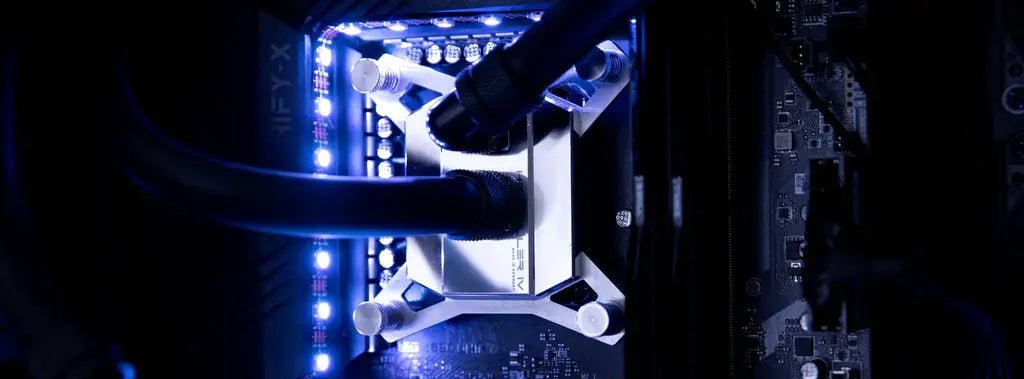
Soft tubing vs Hard Tubing
Share
Soft Tubing vs Hard Tubing
Are you considering water cooling for your PC to achieve optimal performance and temperature control? Well, one important decision you'll face is choosing between soft tubing and hard tubing, each has its own advantage over one another. Let's dive in and find out which tubing style suits your needs!
Soft Tubing: Flexibility and Convenience
If you prefer an easy-to-handle option, soft tubing is your go-to choice. Made of flexible materials like PVC or EPDM rubber, it offers the following advantages:
1. Flexibility and Ease: Soft tubing is incredibly flexible, allowing you to effortlessly route and bend it around tight corners or complex setups. It's a breeze to install, making it ideal for beginners.
2. Wallet-Friendly: Cost matters, right? Soft tubing is generally more affordable compared to hard tubing, making it an attractive option if you're on a budget or looking for a cost-effective cooling solution.
3. Hassle-Free Maintenance: Soft tubing's pliability makes maintenance tasks a breeze. Adding or removing components, draining the loop, and routine cleaning are a piece of cake. You won't need any specialized tools to disconnect and reconnect the tubing. By adding a bit of extra slack, it's also possible to disconnect a GPU whilst it's still connected to your loop, so you can gain access to your motherboard's M2 drives.
4. Aesthetic Appeal: Soft tubing comes in various colors, allowing you to match your PC's theme or create visually stunning configurations. However, keep in mind that prolonged exposure to coolant or UV radiation may cause most tubing to lose transparency and become discoloured over time. EPDM rubber on the other hand is quite resistant to degradation which means longer service intervals.
Hard Tubing: Rigid and Stylish
If you're all about the sleek and polished look, hard tubing is the way to go. While it requires more effort during installation, hard tubing offers some unique benefits:
1. Rigid Elegance: Hard tubing provides a clean and professional appearance for your water cooling system. Its rigid nature helps maintain its shape, resulting in a more organized and visually appealing setup. No more unsightly bends and kinks!
2. Built to Last: Hard tubing is more durable and heat-resistant compared to its softer counterpart. It won't easily deform or collapse under high pressure, making it a reliable choice for long-term use.
3. Better Flow, Better Cooling: With its smooth interior surface, hard tubing minimizes fluid turbulence, allowing for improved flow rates. This ultimately enhances the overall cooling efficiency of your system.
4. Unleash Your Creativity: Hard tubing can be cut and shaped to precise lengths, giving you the freedom to create customized configurations. With careful planning and a touch of skill, you can achieve intricate and visually stunning water cooling loops.
5. A Bit More Elbow Grease: Unlike soft tubing, disassembling a loop with hard tubing requires more effort and tools such as pipe cutters and heat guns. Maintenance tasks can be time-consuming, especially if changes or repairs are necessary. We'd recommend hard tubing for experienced builders as it can be quite a process to take apart a loop if you need to make any changes in your system.
So which one?
When it comes to PC water cooling, the choice between soft tubing and hard tubing depends on your unique needs, preferences, and the level of effort you're willing to invest. To sum it up, soft tubing offers flexibility, convenience, and affordability, while hard tubing provides a sleek and durable look. Consider your priorities, weigh the pros and cons, and make an informed decision that will keep your PC cool and stylish. Happy cooling!
